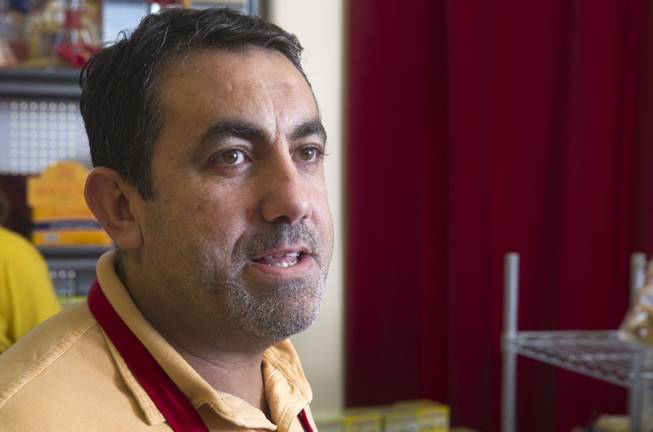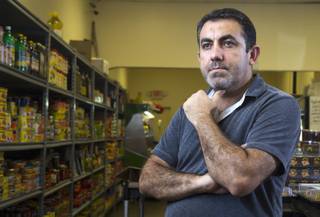
Business owner Abdul Nasser Karouni has been waiting since 2012 to become a U.S. citizen.
Sunday, July 27, 2014 | 2 a.m.
Abdul Nasser Karouni answered the same questions from the FBI agent for two hours.
The first few questions were basic: What’s your name? What’s today’s date? What do you do after work?
Eventually, the real inquiries came.
Do you know someone with Hezbollah?
Have you ever sent money to Hezbollah?
To those, Karouni repeatedly answered “No, God forbid.” The Las Vegas businessman, who has lived in the United States for 11 years, continued to deny any connection to Hezbollah and other militant groups, or any wrongdoing. Next, he was hooked up to a polygraph machine.
Karouni says he was allowed to leave after five hours, but agents asked him to come back the next day for more questioning. He agreed but said his lawyer would come with him. According to Karouni, the FBI’s response was clipped: Don’t bother; no more questions.
Karouni wasn’t arrested or charged with a crime after the October 2012 interview at the FBI office in Las Vegas. He went home to his U.S. citizen wife.
He was lost for answers. The couple had applied for citizenship and passed the tests at the same time. Karouni’s wife was sworn in as a citizen in May 2013. His 16-year-old son was granted derivative citizenship through his mother. He has three siblings in the country, all U.S. citizens. Karouni says he has no idea what’s behind the investigation and delay, and his lawyer has not been much more successful at prying loose an explanation.
Ever since he applied for citizenship, he has been confronted with extra security screenings every time he flies. While his brother took their mother to Lebanon in her final days, because she wanted to be buried in her birthplace, Karouni stayed in Las Vegas and missed her funeral because he was too anxious to travel.
When the citizenship process goes smoothly, it typically takes five or six months for someone to go from application to taking the oath of allegiance. Karouni has been waiting since October 2012.
“After my wife got her citizenship and a few months passed, I was worried,” Karouni said. “I don’t travel anymore. I can’t think of any reason why this is happening. I came here because Lebanon is dangerous. I came here to give my family a better life and for opportunities that don’t exist there.”
FOLLOWING FAMILY TO OPPORTUNITY
Hezbollah, classified as a terrorist organization by the U.S. State Department, is rooted in the Shia Muslim community of southern Lebanon. Karouni, a Shia Muslim, was born in the southern Lebanese city of Tyre on New Year’s Day 1971.
Like his father, he became a butcher. While three of his eight siblings and his mother immigrated to the United States, he stayed behind to take over his father’s shop.
In 2003, his brothers — one a professor in Texas and one an engineer who previously worked for NASA — sponsored Karouni for a visa so he could come to the United States. Karouni came for a few months, then went back to Lebanon to settle his affairs before moving his family to California, where his sister lives.
He worked as a butcher in Los Angeles before moving to Las Vegas in 2006 for a job. Working in a Mediterranean market near Chinatown, Karouni met Ghazwan “Gino” Salem, an Iraqi Catholic and U.S. citizen. They quickly became good friends.
“There are some people who don’t want to mix. If they are Christian, they don’t socialize with Muslims and vice versa, but I’ve never seen it that way,” Salem said. “I left the Middle East for that reason. Abdul left for that reason. He is a good man, a man you can trust, a family man. His kids play with my kids. My family celebrates holidays with his family, and his family celebrates with mine.”
After three years, Salem and Karouni decided to venture out on their own, opening Afandi Restaurant and Market on West Charleston Boulevard. At first, they ran the shop themselves, working 13 hours a day for a year with no vacation.
Now, the shop does steady business, employing eight people, drawing in many Muslims from the local community who come for specialty Middle Eastern beans, spices, produce, pastries and Halal meat. Southern Nevada is home to about 10,000 Muslims.
Karouni says federal officials haven’t contacted him since the 2012 FBI questioning, and no one will tell him why his application has been held up.
PROFILING OR PROTECTING?
Karouni’s lawyer, longtime immigration attorney Ed Prudhomme, says federal authorities are violating Karouni’s right to due process by delaying his citizenship application without pressing charges or explaining to him the nature of the investigation. As such, officials are denying Karouni the right to clear his name, Prudhomme argues.
Prudhomme says his client’s situation is similar to that of people who have tried to challenge their inclusion on the federal government’s no-fly list. A federal judge recently ruled that the process for placing people on that list was unconstitutional because the list is secret and there is no substantive way to challenge it.
Karouni says ever since he applied for citizenship, he has been unable to check in online before his flights and always is pulled out of line for additional screening. People on the no-fly list are not allowed to board planes, but there is also a “select list” maintained by the FBI and Department of Justice that identifies people who can board but are subject to greater security measures.
Once permanent residents apply for naturalization, they are fingerprinted, their names are run through a federal database, and they undergo other security checks. A public records search on Karouni shows no criminal history and a single speeding ticket, dismissed in court, from 2008.
The FBI did not respond to several messages seeking comment. Prudhomme filed a formal request for Karouni’s FBI file at the beginning of the year and received the file Monday.
Parts of the report are redacted, but the file confirms that Karouni was questioned using a polygraph machine about everything from his day-to-day life to whether he knew anyone in Hezbollah, Hamas or any other Islamic militant organization. Karouni denies any ties to the groups, according to the file, and mentions that he sent his children to Catholic schools in Lebanon instead of the Hezbollah-sponsored ones.
Prudhomme says the file shows there is no substantive or ongoing investigation of Karouni, and asked Citizenship and Immigration Services for a meeting to spur a decision on the citizenship application but was denied.
Prudhomme says he is considering filing a lawsuit.
“The whole concept of America (is) that you’re allowed to know what’s going on and to face the people accusing you,” Prudhomme said. “If you want to charge the guy with something, charge him. I think he’s being profiled because he’s Lebanese and he’s from an area where there are big anti-American and anti-Israeli feelings.”
Until the FBI presses charges or presents evidence of a crime, Karouni is a victim of profiling, Prudhomme says.
“I do ask myself: ‘Why me?’ ” Karouni said. “Why did all my siblings, my wife, my son, all get citizenship and I didn’t? I don’t go anywhere. I’ve never had any problems. Is it because of someone I talked to? Is it because of someone who comes to the store? I can only ask, ‘Why?’ ”
While U.S. Citizenship and Immigration Services has the final authority to approve or deny citizenship, any law enforcement agency can indefinitely block approval while someone is investigated. Maria Elena Upson, spokeswoman for Citizenship and Immigration Services, says citizenship is a “benefit, not a right.”
“After 9/11 especially, certain people require additional vetting,” said Upson, who would not comment specifically on Karouni’s case but spoke generally about the process. “We want to make sure that someone applying for citizenship or other benefits does not want to cause us harm. … At any given time when you go to a naturalization ceremony, you literally see people from countries A to Z. (Additional scrutiny) has nothing to do with where you are from.”
There is no recourse for a permanent resident, no form to fill out, no appeal process. They simply must wait.
“We will hold the application until the investigation is complete,” Upson said. “Some take a few months. Some take a year. Some take longer.”


Join the Discussion:
Check this out for a full explanation of our conversion to the LiveFyre commenting system and instructions on how to sign up for an account.
Full comments policy